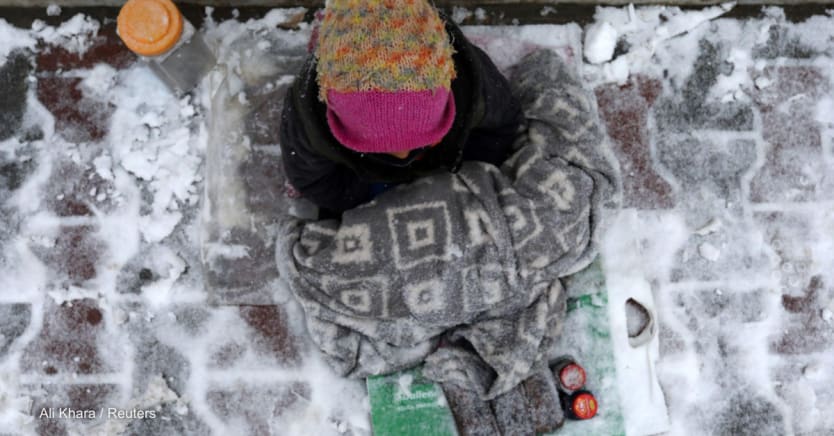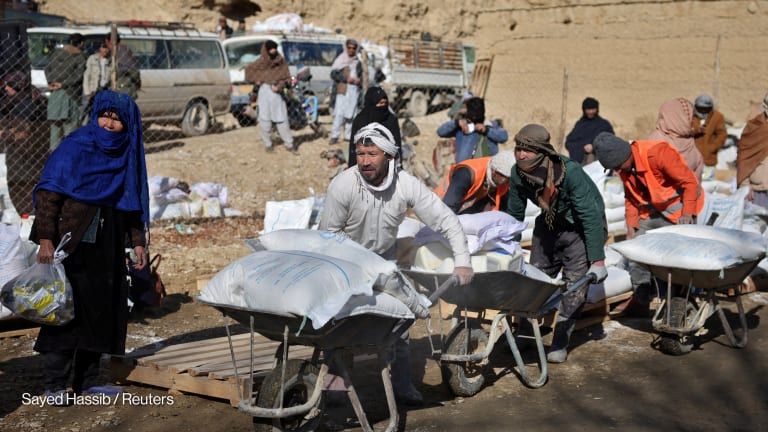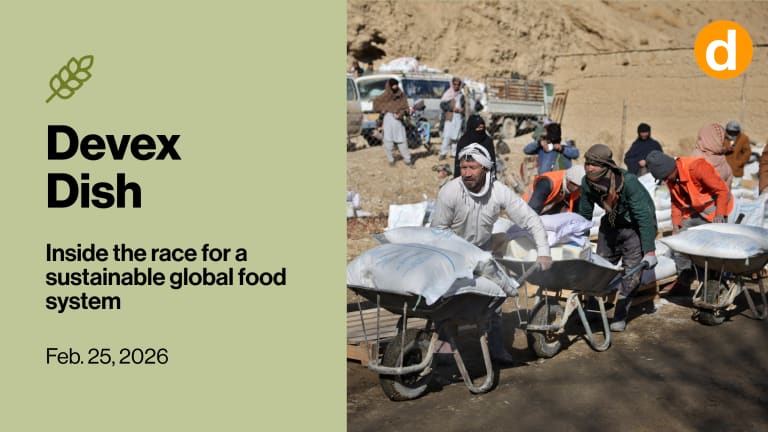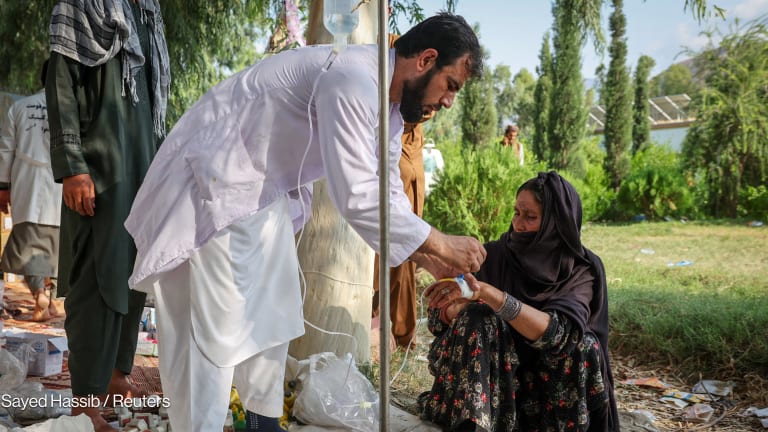
Afghanistan’s collapse happened so quickly it took even seasoned aid workers by surprise. Across the spectrum, from diplomats to humanitarians, there has been profound shock at the speed and totality of the economic malaise that has hit since the U.S. withdrawal in August.
Mary-Ellen McGroarty, the World Food Programme’s country director in Afghanistan, is among those left reeling. She was recently in Washington, as the organization lobbies key governments to boost humanitarian support for Afghans who increasingly have little to eat.
But funds are drying up as quickly as money comes in.
“We run out of money by March. We have a shortfall of $1.9 billion,” McGroarty told Devex in an interview last week as talks were set to begin in Oslo, Norway, between Western powers and the Taliban. “I am terrified as to what will happen if we don't have the resources to respond.”
She quickly lists her fears in that worst-case scenario: “starvation, death, migration, radicalization.”
The numbers on Afghanistan are staggering. Going into 2020, WFP said 11 million people in the country were food-insecure. This year, that number has shot up to 22.8 million so far, with WFP saying it plans to reach them all with assistance. The country of around 40 million people looks set to have some 97% of the population living in poverty by the middle of this year.
Politics and the vestiges of conflict are only part of the problem. The country has been hit by COVID-19 and is also suffering from its worst drought in decades, devastating agriculture and pastoralism. The only hope on the horizon is that the next harvest will be better than the last.
This winter, though, people are skipping meals to have something to eat the next day. Aid workers say Afghans are not only selling their belongings to stay afloat, but they are also selling their children.
“It’s a very traumatic time for the people of Afghanistan,” McGroarty said. “In all my long career in WFP, I’ve seen this deteriorate, escalate, and implode at a pace and scale that just stunned me. Week on week, we’ve just seen it get worse.”
The ironic twist is that the past five months have seen the United Nations’ access to Afghanistan improve. Without a raging conflict, WFP generally has better reach across the country than it did before U.S. forces left.
The agency says it can carry out its mission, including providing direct food assistance and cash for people to buy food in markets — if it is able to secure funding. Its work also extends to supporting farmers and building up food supply chains, as well as tailored programs for vulnerable groups, such as breastfeeding mothers.
The U.N. says it needs $4.4 billion for Afghanistan this year, the largest single country humanitarian appeal of all time. Additionally, the U.N. wants an additional $3.6 billion to keep basic services running, including those related to health, infrastructure, education, and support for livelihoods, given the lack of formal structures. Whether donors will come up with the funds and then let them into the country remains unclear.
The Norwegian Refugee Council said reaching millions of people in need would be “impossible” unless the U.S. and other Western powers changed their sanctions regime, meant to target the Taliban.
“The unresolved liquidity crisis is a key driver in what is becoming the worst humanitarian catastrophe in the world,” said Jan Egeland, NRC’s secretary-general, in a statement.
Egeland warned that “unless the US Treasury and other Western financial authorities enable us to transfer the aid money, we will be forced to work with our hands tied, unable to get that money to the communities who desperately need it.”
“The country becoming an impoverished nation is not a good outcome for anybody. A darkness then probably takes over everything.”
— Mary-Ellen McGroarty, Afghanistan country director, World Food ProgrammeLast month, the World Bank provided WFP with $180 million, which is already being put to use to get food to people in need, according to McGroarty. And the U.S. has made humanitarian carve-outs to its sanctions regime, helping get aid into the country. But this does not unfreeze the economy, with spiraling poverty and greater dependence on handouts.
The talks between the Taliban, the de facto rulers of Afghanistan, and Western authorities took place in Oslo this week — each side with different objectives, ranging from greater recognition to internal policy changes. But there was no concrete result on a path forward out of the deadlock. After the meetings, U.N. Secretary-General António Guterres did not mince words, warning that the economy was in free fall, with sanctions among the issues.
“For Afghans, daily life has become a frozen hell” amid a harsh winter, he told the Security Council on Wednesday. “When it comes to complex humanitarian emergencies, Afghanistan is as bad as it gets.”
Guterres, the head of the premier global organization founded on the rules-based international order, was surprisingly in favor of bending regulations, given the dire circumstances.
“We need to suspend the rules and conditions that constrict not only Afghanistan’s economy, but our lifesaving operations,” he said, urging donors to get funds into the country to pay civil servants’ salaries.
Part of the issue is that the West does not want to recognize the Taliban as the country’s legitimate government — and some fear that paying salaries would do just that.
“The visit did not bestow international recognition on the de facto regime,” Norway Prime Minister Jonas Gahr Støre insisted Wednesday, after the Oslo talks. He said the “primary responsibility” for dealing with the crisis remains with the Taliban, which he indicated is not budging on key human rights issues.
For now, the sanctions on the Islamist group remain in place, which has spillover effects to the lives of everyday Afghans. The banking sector is melting down, there is a liquidity crisis, and the economy has ground to a halt.
The country was once reliant on foreign funding for approximately 75% of the government’s budget. It all dried up, virtually overnight, as the U.S. withdrew. Central bank funds are frozen abroad. People who once worked for a living became beggars almost instantly.
More reading:
► UN Security Council, US Treasury move to ease aid to Afghanistan
► Afghanistan's banking sector is nearing collapse, UN warns
“Men are telling me they scavenge the bins in the market to find bread to bring home to their children,” McGroarty said. Women who worked in factories are now back in their houses, contributing to the reversal in progress on women’s rights.
“I have witnessed in the faces of women the trauma that they're going through,” McGroarty added.
Negotiations between the Taliban and Western powers, she said, must “put the people of Afghanistan front and center.”
The power game, though, appears set to drag on for a while longer.
While the U.N. readily admits that a humanitarian response will hardly end the deep pain in the country, the hunger situation has reached such a state that its officials see no alternative, at least for now. Malnourished children are arriving at hospitals at increasing rates, with doctors not getting paid and medical supplies dwindling.
“We need a fully funded humanitarian response because people are just on the brink,” McGroarty said. And the economy has to get back on a footing — and soon. “The country becoming an impoverished nation is not a good outcome for anybody,” the country director said. “A darkness then probably takes over everything.”
Search for articles
Most Read
- 1
- 2
- 3
- 4
- 5








